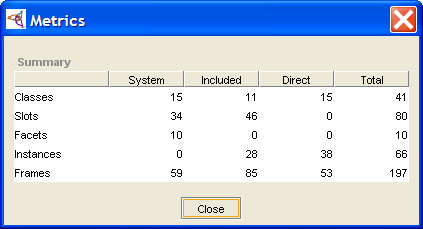Difference between revisions of "PrF UG projects project metrics"
| (4 intermediate revisions by the same user not shown) | |||
| Line 2: | Line 2: | ||
== Project Metrics == | == Project Metrics == | ||
| − | {{PrF_UG_TOC_projects}}<div id='prf_ug'> | + | <noinclude>{{PrF_UG_TOC_projects}}<div id='prf_ug'></noinclude> |
<i>Project metrics</i> provide information | <i>Project metrics</i> provide information | ||
| Line 12: | Line 12: | ||
To view project metrics, select <b>Project | Metrics</b>: | To view project metrics, select <b>Project | Metrics</b>: | ||
| − | <div>[[Image:PrF_UG_projects_metrics.png| | + | <div>[[Image:PrF_UG_projects_metrics.png|frame|none| |
| + | Metrics dialog]]</div> | ||
=== Scalability and Tuning === | === Scalability and Tuning === | ||
| Line 30: | Line 31: | ||
Aside from limiting the size of the knowledge base, | Aside from limiting the size of the knowledge base, | ||
the most important thing to tune is the heap size. | the most important thing to tune is the heap size. | ||
| − | For more information, | + | For more information, see [[Scalability and Tuning]]. |
| − | see [[ | ||
| − | </div> | + | |
| + | <noinclude></div></noinclude> | ||
Latest revision as of 17:35, November 13, 2008
Project Metrics
Project metrics provide information about the number of frames in the current project. This information can be useful in analyzing performance issues.
Viewing Project Metrics
To view project metrics, select Project | Metrics:
Scalability and Tuning
Protege-Frames has successfully handled "simulated" knowledge bases (generated by a program) as large as 5M frames (classes & instances). Actual knowledge bases as large as 100K frames give acceptable UI performance if supported by the database backend.
For file-based projects, the primary impact of increasing the number of frames is that the project takes longer to load (load time is roughly proportional to the number of frames). For database projects, slow operations include expanding a class with a lot of direct subclasses and displaying the instances for a class with many instances.
Aside from limiting the size of the knowledge base, the most important thing to tune is the heap size. For more information, see Scalability and Tuning.
